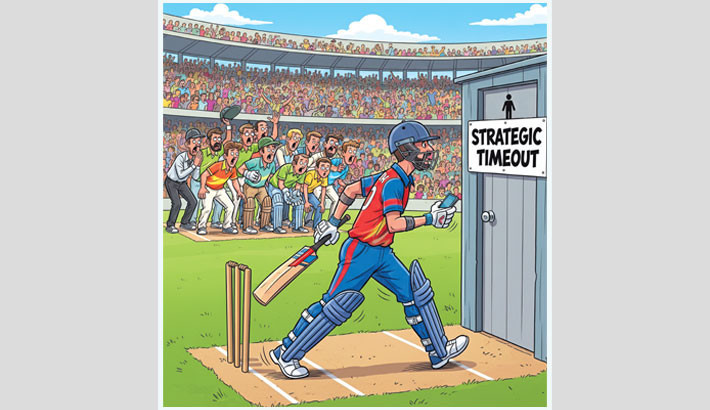Every timeout, a bathroom break, suspicious decisions
Hidden phone and tactical chaos put Rajshahi player under anti-corruption lens
Muhammad Jubair, Dhaka
Published: 28 Aug 2025

Representational Image
Amid all the media reports on alleged match-fixing in last year’s Bangladesh Premier League (BPL), one key player’s name keeps popping up as the independent inquiry committee submitted its preliminary report to the BCB on Tuesday. The player, who was part of Bangladesh’s recent tour of Sri Lanka, had played for Durbar Rajshahi, the most controversial franchise from the eleventh edition of the BPL.
Daily Sun learned that several cricketers from that team filed an official complaint with the Bangladesh Cricket Board’s Anti-Corruption Unit (ACU) against their 32-year-old teammate on corruption charges. After receiving the official complaint from the two players, the ACU took the matter seriously and launched a deeper investigation.
When contacted, the ACU declined to make any official statement regarding the issue.
However, multiple sources close to the investigation confirmed to Daily Sun that the complaint had been registered when the tournament was shifted after the opening phase in Dhaka and, since that point, his movements were scrutinized.
As part of their ongoing probe, the ACU summoned that particular player for questioning on 14 January during the Chattogram phase of the tournament. Sources revealed that his actions and decision-making throughout the tournament appeared to be driven by ulterior motives, often contradicting fundamental cricketing principles.
The 32-year-old top-order batter’s unusual on-field choices and behavior raised suspicions among his teammates, ultimately prompting them to report the matter to the Anti-Corruption Unit (ACU).
Concerned by these inconsistencies, the Durbar Rajshahi cricketers felt compelled to step forward and file an official complaint.
One player, speaking on condition of anonymity, shared his experience playing with that player.
“I asked for a field setup, but he didn’t let me set my field. He wanted something else.” The player suggested that these tactical choices did not align with the team’s best interests, further fueling suspicions.
“We are smart enough to understand what was happening. From the moment I joined the team, I had a feeling that I would be targeted. The environment was such that anyone could raise questions about anyone. That’s why I was the first one to inform the ACU about what I knew,” the same player added, expressing his frustration. “I told one of the team owners that they didn’t need to pay me for my performances—just compensate me for the mental torture they put me through,” he further added.
Another player also voiced his concerns, revealing that he was deliberately put in a difficult position.
“I was asked to bowl in a situation where I shouldn’t have been bowling in the first place. It felt like I was being pushed aside, set up to fail,” he said.
This player confirmed that he had already informed the ACU about his concerns while the team was in Sylhet.
“I spoke to the head of the Anti-Corruption Unit and explained everything in detail. As you can see, the names of the accused players are now surfacing in the media. I provided the ACU with all of their names,” he added.
The player further accused the player in question of violating BPL regulations by using a mobile phone during matches, an act that raises serious integrity concerns.
According to him, that player had allegedly hidden the phone in the dressing room’s bathroom area to evade detection. Mobile phone usage is strictly prohibited for players during matches to prevent any potential breaches of integrity, including unauthorized communication or information leaks. This allegation adds another layer of concern to the ongoing investigation.
“I informed the ACU about it. He used to go to the bathroom during every strategic timeout—every single time,” the player claimed, suggesting a pattern of behavior that further fueled suspicions.
Another Rajshahi player also expressed his concerns, questioning the on-field decisions taken by the captain.
“What happened on the ground—any cricketer, even at the age-group level, would tell you that we didn’t implement it properly,” he said. “What I witnessed, you simply cannot apply in a cricket match—not even if you have the most basic understanding of the game,” he added.
(The writer can be reached at: [email protected])

